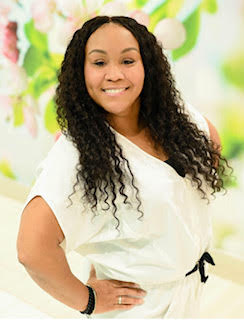
Dr. Meka Douthit EL was working the night shift as a new nurse at Wake Forest Baptist when a Ku Klux Klan member arrived at the hospital with chest pains.
As soon as Douthit EL walked into the man’s hospital room, he became agitated and insisted he didn’t want her as a Black woman to treat him. He asked to speak with Douthit EL’s supervisor, hoping he could get a White nurse instead.
Douthit EL, who had just started her first nursing job after graduating from UNC Greensboro in 1996, offered to make a deal with the man. She suggested they put aside their opinions of each other and work together to address his health issues and obvious needs.
“I said, ‘What I need to do right now because we can’t lose any time is I need to treat your chest pain,’” Douthit EL said. “I said, ‘Will you just please allow me the opportunity to take care of you and treat your chest pain? And what I want in return is that you show me just some mutual respect.’ I remember telling him, ‘The only thing in between you and the treatment we have to help you is your opinion of me plus the agreement of you to receive my help.’”
While the man never thanked her, Douthit EL got the feeling he appreciated what she did for him. She had become the type of caring, understanding nurse she needed but didn’t get a few years earlier while pregnant with her first child at age 19.

Douthit EL has put people’s negative opinions behind her and made a name for herself during her extensive nursing career, which is being celebrated during Black History Month.
In September, Douthit EL, who works as a director of nursing at Moses H. Cone Memorial Hospital, was sworn in as president of the North Carolina Nurses Association (NCNA). She’s only the fourth African American to oversee the leading professional organization for the state’s registered nurses.
“When I got connected with the NCNA and saw just the mentorship, support, leadership development, and opportunities they offer, I said, ‘Oh gosh, I think I could be president. I don’t know when it’s going to happen, but that’s something that I want to happen in my life,’” Douthit EL said.
Two of the NCNA’s previous Black presidents also have UNCG connections.
Ernestine Small was the University’s first Black faculty member when she was hired as an instructor in 1967, and she remained on the School of Nursing faculty until 1991.
Meanwhile, Dr. Ernest Grant earned his master of science in nursing and PhD from UNCG. He now serves on the University’s board of trustees in addition to his role as president of the American Nurses Association.
“I am continually impressed by the quality of nurse leaders educated at the UNCG School of Nursing. Meka Douthit EL continues that proud heritage. As a woman of color, it is not always easy, but still she continues to make a difference in nursing and in health care.”
Dr. Debra Barksdale, dean of the UNCG School of Nursing
Douthit EL saw the importance of strong leaders and a sense of community as a kid while growing up in her family’s apartment above Gilmore’s Funeral Home, which her grandfather opened in Winston-Salem.
Both of Douthit EL’s parents worked as morticians, and she saw their professionalism and how they showed compassion to grieving families. She also accompanied them to the hospital after someone died, giving her a familiarity with loss that she’d later need as a nurse.
“I used to think it was so exciting to go with them to go pick up bodies, so I guess that would be my first exposure to the hospital because when I was a little girl I used to ride with them on death calls,” Douthit EL said. “So, that kind of was my first exposure to, I guess, the end of the life span, the death portion of it.”
While Douthit EL received a full scholarship to pursue a chemical engineering degree at North Carolina A&T State University, she quickly realized she wanted to work more with people.
Her older sister had earned a bachelor of science in nursing degree from UNCG, and after doing some soul searching, Douthit EL decided to become a nurse as well.
She said she knew she had made the right decision to switch majors after she had a bad experience with a nurse during her difficult pregnancy at 19.

Since Douthit EL was a college student at the time, she was on Medicaid and the Women, Infants, and Children (WIC) health program. A nurse who was treating Douthit EL seemed to be bothered by her during a visit.
“She categorized me. She categorized me as being ‘Oh, you’re just another teenaged person’ because I was 19,” Douthit EL said. “You’re having a baby, but she treated me less than. She was so mean, so uncaring when I needed somebody to be caring and understanding.”
Douthit EL said the experience made her want to become a nurse who sees patients for who they are instead of judging them simply off what was assumed by their background or written on their medical charts.
A few years later, as she prepared to treat the Ku Klux Klan member, she told him no one outside of his hospital room had to know what she was doing for him.
“I didn’t get a thank you. He didn’t say it with his words, but he said it with his eyes,” Douthit EL. “He said it with his silence. He said it by agreeing to allow me to treat him, to accept me.”
Story by Alex Abrams, School of Nursing
Photography provided by Meka Douthit EL and the North Carolina Nurses Association